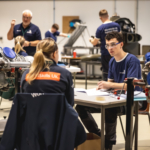Clare Howard, the Chief Executive of NatSpec (the National Association of Specialist Colleges) attended the recent Abilympics as part of the UK delegation.
After visiting the competitions, she shared her thoughts with WorldSkills UK:
“There is a deep rooted assumption in our society that disabled people cannot take part in skills competitions, with health and safety concerns, costs and safeguarding issues preventing colleges and individuals from taking part. But as we have seen over the past few days, these concerns are totally misplaced.
At NatSpec, we are clear that skills competitions give young people of all abilities the opportunity to stretch themselves, giving them added motivation to succeed as individuals and by comparing themselves to their peers. They also extend the quality of what colleges provide for their learners, bearing in mind they are already working to prepare people for adult life: alongside work experience and independent living tuition, competitions provide young people with the tools they need to take the next step.
We have been working with WorldSkills UK and other membership bodies to explore the right structure for inclusive skills in the UK as we move forwards and develop our offer. It’s clear that we need the right competitions and the right structure to ensure that people of all levels can be matched with challenges that help them develop as individuals, while ensuring they have the skills which employers need. However, inclusive skills competitions need to mature and develop – and I see NatSpec as a key player in ensuring that this development happens to fulfil the needs of the individual and employers.
Simon Bartley touched on the structure needed for inclusive skills moving forwards: we may need to amend what we offer and what we deliver as the competitions mature. We need an agreement which sees educational experts working with specialists from individual skills to create a technically appropriate competition structure that means everyone can achieve at every level. This structure will need work, and we must ensure that there is a partnership between employers, specific disability experts and educationalists which will mean that competitions develop individuals who are ready for work, and that there are jobs available for them to do. The involvement of employers in this process will keep us honest, and ensure that the skills that participants develop are work-appropriate.
We are all working towards an end product that allows our students to live happy and fulfilled lives, and I see participation in skills competitions at all levels as a key part of this process. Watching Ben and Simon this week has been inspirational, and shown what competitions can do to help young people of all abilities to achieve their potential.”


